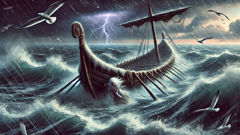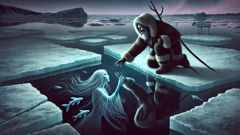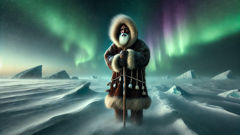Introduction
In the endless reaches of the Canadian Arctic, where the wind’s cry pierces silence and the land lies draped in a cold hush, stories drift between the snowflakes and linger above the shifting ice. The Inuit people, keepers of the North’s ancestral wisdom, have long whispered of Anguta—a name that resonates like the slow creak of a glacier. He is a figure both revered and feared, a ferryman whose presence marks the boundary between life’s fleeting warmth and the enduring chill of the afterlife. Anguta’s myth winds through Inuit tradition, touching on mysteries deeper than any frozen fjord or midnight sea. He is not simply a god nor merely a man; he is the father of Sedna, the formidable sea goddess, and also the one who guides souls to the realm beneath the world, known as Adlivun. Among elders gathered beneath the aurora, tales are told of his sorrow and endurance, of his fateful conflict with Sedna, and of his solitary journeys across the snowfields, carrying the dead toward the place where spirits rest. To know Anguta’s story is to glimpse the core of Inuit understanding—the fragile dance between the living and the dead, the unforgiving power of nature, and the glimmer of wisdom earned at the edge of night. As you step onto the ice with Anguta, let the ancient winds guide you, for his tale is one of consequence, mercy, and the mysteries that shadow us all.
Origins Beneath the Northern Lights
Anguta’s beginnings are woven into the earliest breath of the world, where land and sea struggled for dominion, and the spirits of the earth shaped their destinies. In the age before names, the people of the north watched as long nights bled into brief, bright days. It was in this liminal world—one foot in darkness, one in light—that Anguta first emerged. He was not born of flesh, but of need: the need to guide, to separate, and to bind together what should not touch.

Unlike other spirits who roamed the tundra in flashes of fur or wind, Anguta was a presence of substance. Some say he arose from the land’s own ache for peace, his body broad and solid as an ancient stone. Others believe he stepped forth from the ocean, salt-streaked and silent, with hands strong enough to shape destinies. But all agree that he became the bridge between worlds, his footsteps carving invisible paths from village fires to the endless snowfields beyond.
His most enduring tie was to Sedna, his only daughter. The story of Sedna is well known among Inuit families: a young woman with insatiable hunger, cast into the sea by her father’s own trembling hands. As Anguta paddled his umiak through churning waters, Sedna clung desperately to the edge of the boat, fingernails biting into wood. In a moment that would echo through centuries, he pried her fingers away—sometimes out of anger, sometimes mercy, sometimes terror. Sedna tumbled beneath the waves, her rage and pain transforming her into the goddess of the sea, ruling over all creatures below.
Anguta’s act was not one of cruelty alone. The old ones say that he bore a sorrow so heavy it bent his back and slowed his step. He wandered the snowy plains, haunted by guilt, knowing that through his hands, the world had changed. Yet he did not turn away from his burden. The land needed balance: Sedna ruled below, and he, now both father and ferryman, would keep watch above. From that moment, Anguta became more than a man—he became a psychopomp, the silent guide who gathers those who pass from life and ferries them to the underworld’s chill embrace.
The people of the Arctic learned to read the signs of Anguta’s approach: the soft hush that settles at nightfall, the sudden stillness before dawn, the distant crack of ice shifting under moonlight. Those who had lived well would see his shadow and feel a curious comfort, knowing their spirits would be carried gently toward Sedna’s realm. But those who had sown discord or failed to honor their kin might sense only dread, for Anguta showed little mercy to those who spurned the delicate web of Inuit law. His paddle was both staff and judgment, his silence the last word before Adlivun’s gates.
It is said that Anguta’s journeys were not only for others. At times, when the world’s pain grew too heavy, he would slip quietly from the village, paddling far into the frozen wastes. There, beneath the endless sky, he would whisper to Sedna, offering words of regret and longing that the wind would scatter. Some nights, when the aurora blazed brightest, people swore they saw two figures on the ice—one tall, one shadowed by the sea—caught in conversation only spirits could hear.
The Ferryman’s Path: Souls Between Worlds
As the years wove their silent thread across the Arctic, Anguta’s presence deepened, settling into the bones of every drift and shadow. He became known as the Ferryman—the one whose paddle carved silent trails through both snow and dream. The Inuit believed that when breath left a body and warmth faded from flesh, it was Anguta who would appear at the threshold, neither demanding nor inviting, but simply waiting.

The dead did not walk alone. Anguta’s approach was marked by the barely perceptible crunch of snow, a cold hush that settled in the chest, or the faintest reflection in a pool of meltwater. He gathered each soul with patience, lifting them gently onto his sledge or, when the sea was open, into his umiak. He was a figure of paradox: his hands were rough and strong, yet capable of immense tenderness. To the elders, he resembled the greatest hunters—men who understood that mercy must walk hand in hand with necessity.
The journey to Adlivun, the land beneath the world, was long and perilous. Spirits followed Anguta across fields glazed with hoarfrost, down mountain passes where the wind sang in mournful tones, and over sea ice that groaned with memory. Sometimes, he told them stories—fragments of ancient wisdom, cautionary tales about pride and forgiveness. Other times, silence fell, filled only by the sound of their passage and the distant call of seals beneath the ice.
For those whose hearts carried kindness and respect for the living world, Anguta’s company was a balm. He listened to regrets and last wishes, his presence easing the sharp ache of farewells. But there were others who bristled with anger or remorse, and Anguta’s gaze grew distant then—his paddle cutting harder through the snow, his shadow lengthening. These souls would linger in Adlivun, waiting for forgiveness or renewal before moving on to a brighter existence.
The underworld itself was not a place of fire or torment, but a cold expanse echoing the Arctic’s own harsh beauty. Here, spirits rested in silence, tended by Anguta and watched by Sedna from her watery throne. Some souls returned, reborn into the world above; others faded gently, their memories preserved in the stories told around village lamps. Anguta’s role was never to judge outright, but to guide—to ferry each soul to its rightful destination, shaped by the weight of its own deeds.
There were legends, too, of Anguta’s own struggles as he walked between worlds. The burden of so many souls pressed heavily on his shoulders. Sometimes he would pause by a lonely cairn or beside a frozen inlet, staring into the endless white, questioning if his path could ever lead him back to forgiveness with Sedna. Each journey deepened his sorrow but also sharpened his wisdom, for only by knowing loss could he truly lead others through it. It was in these moments that Anguta found kinship not only with the dead but with all those who carry unseen burdens—reminding the living that guidance often comes from those who have suffered and endured.
Reckoning with Sedna: Father and Daughter in the Depths
While Anguta bore his duties in the land of ice, Sedna ruled beneath the sea—her rage cooling into dominion over every living creature in the ocean’s depths. She was a goddess shaped by betrayal, her hair swirling like kelp in the darkness, her eyes reflecting the shimmer of a thousand fish. For many years, she and Anguta remained divided: he on the surface, carrying souls across tundra and ice; she below, both creator and jailer of all that swam.

But there were nights when the boundaries between worlds thinned—when the moon rose low and full, or when storms battered the coast until even stones seemed to weep. On such nights, Anguta would kneel beside an open lead in the ice, calling softly into the water’s black mirror. Sometimes, his voice went unanswered, swallowed by the cold. Other times, ripples disturbed the surface and Sedna’s shadow appeared—a spectral form with hair streaming outward, her features both beautiful and terrifying.
Their encounters were never easy. Sedna bore the memory of her father’s betrayal like an open wound, and her anger pulsed through every current. Yet beneath her wrath lay a longing for connection—a memory of warmth and laughter before pain had remade them both. Anguta spoke not in excuses but in quiet truths, recounting what he had seen on his journeys: the griefs of mothers, the bravery of children, the wisdom found in loss. He offered these stories like gifts, hoping that understanding might bridge the chasm between them.
Over time, these conversations shifted. Sedna listened more and raged less, her own solitude reflected in her father’s eyes. She asked about the souls he ferried—whether they found peace, whether forgiveness was possible even for those who had caused pain. Anguta, in turn, asked about the creatures she ruled, and how they fared in the ever-changing tides. Slowly, a fragile bond formed—one not of forgiveness, but of shared sorrow and mutual respect.
Their reconciliation was never complete; some wounds run too deep for simple healing. But their meetings became rituals: Anguta honoring Sedna with offerings from the land, Sedna granting safe passage to hunters who respected her creatures. Through their uneasy alliance, a new balance took root in the Arctic. The people flourished when they remembered to honor both land and sea, understanding that survival depended on respect for all forces—seen and unseen.
Anguta’s wisdom deepened with each encounter. He learned that even those cast into darkness could find moments of grace, and that forgiveness was not a single act but a journey—a path walked again and again, even when the cold bites deepest. The spirits he ferried carried this lesson back into the world above, their stories adding new threads to the tapestry of Inuit tradition.
Conclusion
The myth of Anguta endures because it speaks to the cold truths and quiet hopes at the heart of human experience. His story is one of boundaries: between father and daughter, land and sea, life and death. Yet it’s also a story of wisdom—the kind learned not in moments of triumph, but in the slow work of endurance and reconciliation. Through his lonely journeys, Anguta teaches that every soul deserves guidance; that every pain, even when it divides, can seed new understanding. The Arctic remains a place of challenge and beauty, shaped by spirits who walk its snows and swim its depths. For those who listen, the wind still carries Anguta’s name—reminding us that even in the darkest cold, there are paths forward, lit by memory, mercy, and the wisdom of those who walk before us.













